begin quote from:
(CNN)Hillary Clinton emerges from the first presidential debate with a five-point …
Post-debate, Clinton takes the lead
Story highlights
- Clinton tops Trump 47% to 42% among likely voters in a new poll
- Libertarian Gary Johnson is at 7% and Green Party nominee Jill Stein is at 2%
(CNN)Hillary
Clinton emerges from the first presidential debate with a five-point
lead over Donald Trump in the race for the presidency, having narrowed
the enthusiasm gap between her supporters and Trump's, and holding broad
advantages over the Republican nominee as the candidate with the right
temperament and preparation for the job, according to a new CNN/ORC poll.
The
survey finds Clinton topping Trump 47% to 42% among likely voters with
Libertarian nominee Gary Johnson at 7% and Green Party nominee Jill
Stein at 2%.
Clinton's
boost in the race stems largely from gains on Trump among men (from a
22-point deficit with that group in early September to just a 5-point
one now) and sharply increased support from independents, who broke
heavily in Trump's favor in the early September poll but now tilt
Clinton, 44% to 37%.
Clinton
has even gained somewhat among whites without college degrees, who have
been among Trump's most ardent supporters. She trails Trump by 21
points among that group now, down from a 44-point chasm in early
September.
Although
most interviews in the survey were completed before Saturday night's
revelation that Trump may have avoided income taxes for nearly two
decades, the results were clear that about three-quarters of voters
think Trump should release his tax returns for public review (73% say
so, including about half of Trump's own supporters, 47%).
More
respondents also see Trump's refusal to release this taxes as a sign
that he's hiding something than that he's under audit from the IRS (57%
say he's hiding something, 33% that he's holding back due to an audit).
Voters
are in near-universal agreement, though, that paying taxes is every
American's civic duty. Nearly 9-in-10 feel that way while just 12% say
they see taxes as an unnecessary burden to be avoided. Even among Trump
backers, 79% see them as a civic duty.
The
poll, conducted entirely after last Monday's presidential debate, finds
Clinton's supporters increasingly enthusiastic about voting for
president this year (50% are extremely or very enthusiastic now, up from
46% earlier in the month), while Trump backers' enthusiasm has ticked
downward, from 58% to 56%.
Some of
Clinton's edge in this poll can be attributed to the effects of that
enthusiasm shift on the makeup of the likely electorate.
In
the early-September poll, Clinton's backers were less likely than Trump
supporters to be classified as likely voters because of the responses
they gave to questions about their interest in the contest, intention to
vote, and past vote history. That resulted in a sharp shift to Trump
when assessing preferences among likely voters rather than registered
voters.
This time around, her voters are no less likely than Trump voters to qualify as likely voters.
Voters
are about evenly split between issues and personal qualities when asked
which will be more important in their choice for president, according
to the poll, and Clinton gained ground on both sides of that question
post-debate.
Clinton has narrowed
Trump's edge on handling the marquee issues of the economy and terrorism
while increasing her edge on foreign policy, immigration and improving
life for racial and ethnic minorities.
Trump
tops Clinton by four points as better able to handle trade with other
countries, a topic that was one of few high points for Trump in the
debate, while Clinton has the upper hand, narrowly, on several other
issues raised in Monday's debate, including taxes (48% Clinton to 46%
Trump), the criminal justice system (48% Clinton to 45% Trump), ISIS
(48% Clinton to 44% Trump).
The
debate appears to have worsened voters impressions of Trump personally,
59% of likely voters now see him unfavorably, up from 54% in early
September, while Clinton's favorability rating has held fairly steady,
standing at 43% favorable to 54% unfavorable.
Trump
has lost ground against Clinton when registered voters are asked which
candidate is the stronger leader, 45% say Clinton is, 43% Trump. Trump
held an 8-point edge on that question in early September.
Clinton
has widened her edge as the one with the right temperament for the job,
topping Trump by 27 points on that score now, up from a 20 point lead
in early September. She also holds wide leads as better prepared (+22),
more in touch with middle class problems (+17), having a clear vision
for the country's future (+7) and being better able to handle the
responsibilities of commander in chief (+6). Clinton has also narrowed
the gap on honesty, and now stands 7 points behind Trump on that, though
a sizable 15% say neither is more honest and trustworthy.
A
stunning 29% of registered voters say neither Trump nor Clinton is a
person they admire, about on par with the 30% who see Trump as the more
admirable of the pair, behind the 40% who name Clinton as more admired.
Among younger voters, a traditionally Democratic group Clinton has
struggled to win over, a full 42% say neither candidate is a person they
admire, more than name Clinton (37%) or Trump (21%).
Confirming
the results of the CNN/ORC poll of debate watchers released shortly
after the debate ended, the new survey finds about 6-in-10 voters say
Clinton did the better job Monday night, just 24% thought Trump did.
Among those who said they watched, 63% said Clinton was the victor,
about the same as in Monday night's survey.
The
CNN/ORC Poll was conducted by telephone September 28 through October 2
among a random national sample of 1,501 adults. Results among the 1,213
likely voters have a margin of sampling error of plus or minus 3
percentage points. It is 2.5 percentage points among the 1,335
registered voters interviewed.
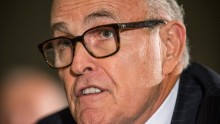
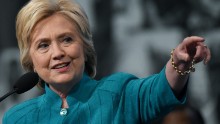








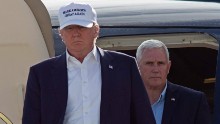


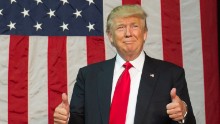





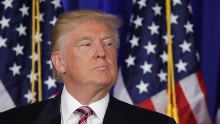
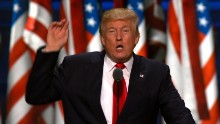


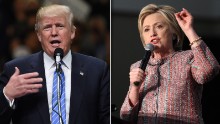




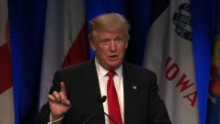












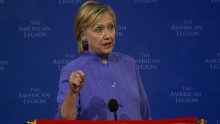


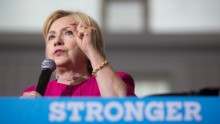
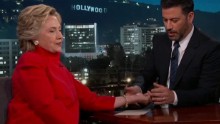

No comments:
Post a Comment